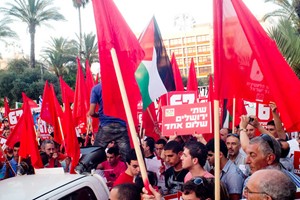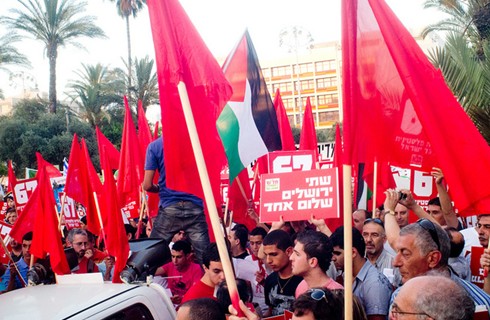
MK Dov Khenin (Hadash) said in that the money Israel is investing in the new settlement plan in occupied Palestinian territories could go a long way to improving the lives of citizens who live within the green line especially in health education and transport. MK Khenin said there are many areas within the green line where such building projects would be welcome but the government prefers to take a step that will further isolate Israel in the world.
Britain, France, China and Cuba, among other countries, condemned on Saturday a plan by Israeli right-wing government to expand settlements in the occupied West Bank and East Jerusalem, saying international confidence in its desire to make peace with the Palestinians was at risk. Stung by a UN vote according de facto recognition to a Palestinian state, Israel on Friday said it would build thousands of new settler homes, including in a wedge zone between Jerusalem and the West Bank, known as E1.

Hadash demonstration for an independent Palestine state aside Israel, Tel-Aviv, June 2011 (Photo: Al Ittihad)
France, which voted with the Palestinians, and Britain, which abstained, had tougher censure for Israel, which wants to keep all of Jerusalem and swathes of West Bank settlements under any future peace accord. Most powers view the settlements as illegal for taking in land captured in the 1967 Middle East war. “If implemented, these plans would alter the situation on the ground on a scale that makes the two-state solution, with Jerusalem as a shared capital, increasingly difficult to achieve,” British Foreign Secretary William Hague said in a statement. “They would undermine Israel’s international reputation and create doubts about its stated commitment to achieving peace with the Palestinians.”
Hague’s French counterpart, Laurent Fabius, spoke of E1 as “the new colonization zone” and said the Israeli expansion plan could “drain the confidence needed for a return to dialogue”. “I call upon the Israeli authorities to abstain from any decision in this direction and to manifest clearly their desire to restart negotiations,” Fabius said in a statement. The Israeli settlement plan was disclosed to the media by officials in Prime Minister Benjamin Netanyahu’s neo-liberal government who spoke on condition of anonymity.
Interviewed on Israeli Channel 2, Palestinian Prime Minister Salam Fayyad said that, if implemented, the Israeli settlement plan would be “most detrimental” to peace prospects. “The challenge to all of us now is to use what happened two days ago (UN upgrade), to build on it, rather than spend too much time either, you know, thinking ‘This is the end of the road’, which it isn’t, from our point of view, or continue to sulk about it and express protestation and anger,” he said.
PLO Executive Committee member Hanan Ashrawi said that the Israeli decision was a “war crime” and an “act of aggression against the State of Palestine.” She said that the decision was a flagrant violation of the Fourth Geneva Convention, which defines humanitarian protections for civilians in a war zone and outlaws the practice of total war. Ashrawi said that Israel was obviously sending a “premeditated” message to the international community following last Thursday’s UN General Assembly vote in favor of upgrading the status of Palestine to non-member observer state. “Israel’s message is that it is continuing to challenge the will of the international community and international law,” she added. “This unilateral and systematic policy is in the context of the Israeli government’s scheme to steal the lands of the State of Palestine and the world must hold Israel accountable for its aggression against the lands of the occupied State of Palestine.”
Palestinian President Mahmoud Abbas told journalists before heading back from New York to Ramallah that “The Fourth Geneva Convention now applies to the State of Palestine within the 1967 borders,” Abbas said. “The lands of the State of Palestine are occupied and it is forbidden to make any demographic changes in them. It is forbidden to transfer the citizens of another country to our state. The presence of Israeli settlers is in violation of international law.”
Abbas said that the Palestinians were expecting only 115 countries to vote in favor of his statehood bid. “We faced horrific and intolerable pressure,” he added. “What is important now is that the State of Palestine and its capital, east Jerusalem, are under occupation. We will never accept a Palestinian state without Jerusalem.”
Abbas called for an end to settlement construction and the resumption of peace negotiations with Israel. “The ball is now in the Israeli and American court,” he said. “I have announced one million times that we want to return to the negotiations. We are prepared for this now and we are not setting pre-conditions. The issue of the Palestinian state and its borders has now become clear with the UN vote. Let’s go and talk about the six core issues: refugees, security, Jerusalem, settlements and water.”


